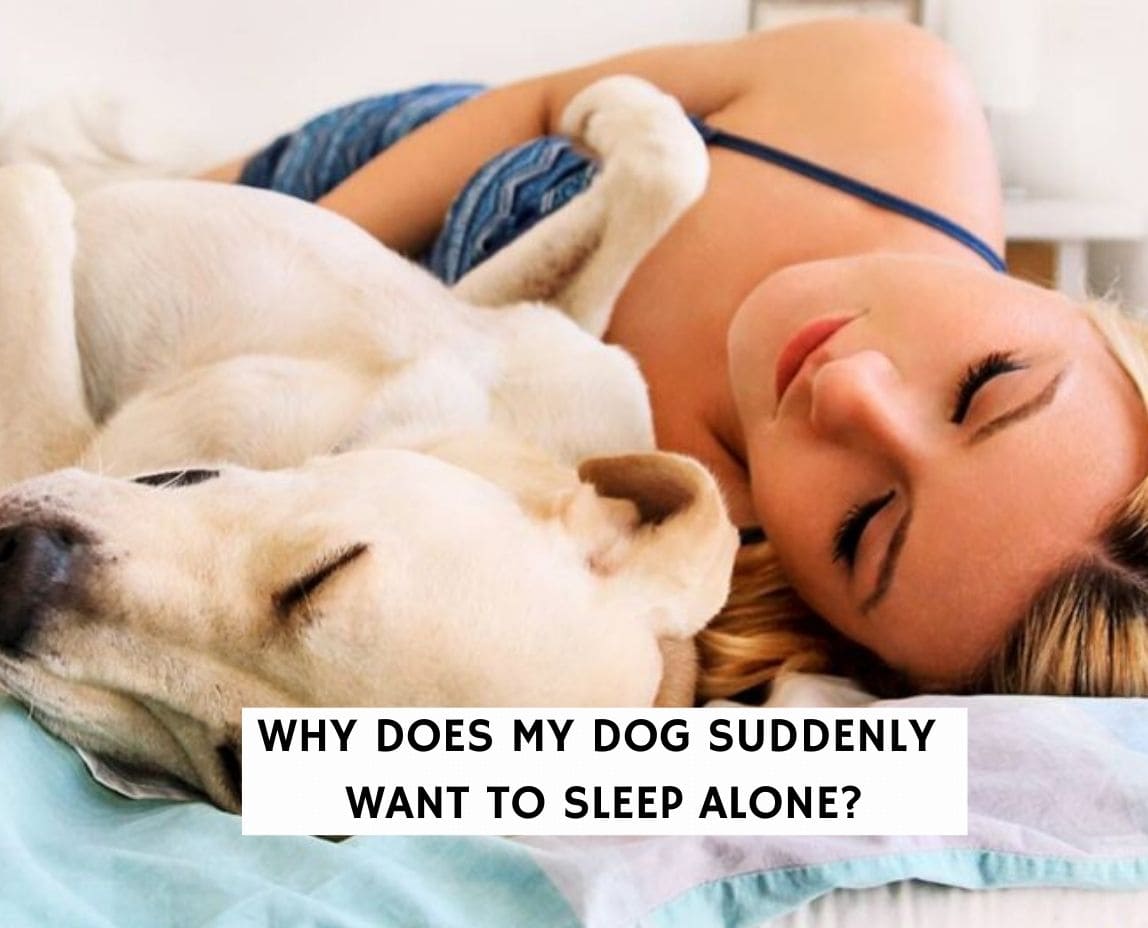When it comes to bedtime, your dog may have some common habits they engage in. They may turn in a circle a number of times, and they may require a certain blanket or toy with them. They may also want to be as close as possible to you as they sleep.
Dogs have their own unique approach to sleeping, and most often, those habits are harmless. While we may scratch our heads at why they do certain things, most often, it’s just about a dog being themselves.
Yet there are times in which their behavior or sudden change in their normal habits may point to a more concerning mental or physical health concern. While this is not always the case, it’s important to monitor your dog’s behavior and habits and be aware of any sudden changes.
For example, perhaps your dog has always wanted to be around other people or animals as they sleep. They like to snooze in a community and always crave to be as close as possible to you as they sleep. Then one day, your dog suddenly wants to sleep alone. They would rather go off by themselves to sleep rather than following their normal habit of sleeping in a room with others. While this can be a harmless behavior, it can also point to other health concerns that you should look into as soon as possible.
To help you provide the best care for your dog, here we share some of the top reasons why your dog may want to suddenly sleep alone. We’ll also uncover some steps you can take to address any potential concerns and get them back to living and sleeping as their full, happy, healthy selves.
Why Does My Dog Suddenly Want to Sleep Alone?
When your dog transitions from wanting to sleep with you in your room to off by themselves, you may see it as a sign of relieve and satisfying that privacy you’ve been wanting without your dog. However, if their change is sudden, it may be an indicator of something else going on. Here we share some of the top reasons why your dog does not want to sleep with you all of the sudden.
Depression
Perhaps one of the most common yet unrecognized mental health issue in dogs is depression. This emotional response is similar to what a human version of depression is like. They may not want to be around other people, leading them to want to sleep alone. Dogs suffering from depression also have a range of other potential side effects, including a change in appetite or not being interested in things that they once used to love doing. They may also avoid situations in which they are around other dogs or other people. They can also develop a habit of hiding from you or from others. Even these side effects note a desire to be alone as they don’t seem to be their happy, healthy and thriving selves.
When it comes to their sleeping habits, they may also experience significant changes. Not only will dogs want to sleep by themselves, they may also be sleeping a lot more than they used to. Even though dogs already tend to sleep quite a bit throughout the day, a depressed dog will want to sleep even more during the day. Even after you come home to greet them, they may be excited you are home, but also go back to enjoying their sleep later on as well.
Comfort
Your dog may also choose to sleep away from others or in a different room out of just their desire for comfort. The room others may be in may be too warm for their liking. They may not have a bed or space to lay which they find comfortable. They may just want to find another spot to rest their head and find some sleep.
Even if they used to enjoy sleeping in a place with others, their preferences may have changed over time. While at one time they wanted a room that was much warmer, such as in the winter, now they may want a cooler space, such as in the summer. Their age and body structure may also indicate what they find to be comfortable or not. This is a common reason why your dog may suddenly decide to sleep alone.
They may also find things in the room they used to sleep in to be disturbing. They may find it too loud with noise or other high-pitched noises that you may not be aware of. The room could be too hot. The furniture may have been moved around, making the space feel different to them.
Usually, this is not a reason to worry. Instead, work toward enhancing their space to make it most comfortable for them. However, it can be helpful to notice if this change is accompanied by any other emotional or physical side effects.
Provide Protection
If you notice that your dog now prefers to sleep in areas like at the front door or across the door of your door or your kids’ door, they may be acting out of a sense of protection. With their dedication to caring for you, your dog may see it as their duty to provide protection at all times, even when they are sleeping. This can help them feel that they are guarding you and provide them assurance that you are well taken care of.
Too Much Energy
If your dog has a tough time calming down at the end of the day, they may prefer to be in a more open environment rather than an enclosed space. They may want to burn off some of their energy before they are ready to retire to sleeping. Sometimes dogs will want to sleep alone if they have too much energy.
Change in Environment
Whether it’s a new house, bringing home a new baby or just adding some new furniture to the room, any change can unsettle your dog. Having new people in the space where they used to sleep can also cause major concerns for them as well. They may begin to feel anxious or stressed out about the changes that they see around them and want to find ways to calm themselves as they adjust to a new environment.
This may include them wanting to sleep by themselves rather that with others. They may also have difficulty sleeping and have other symptoms of anxiety. These accompanying symptoms can include things like pacing, excessive licking or other triggering behaviors. While anxiety in some dogs may them cling to their owner, never wanting to leave their side, other dogs may respond by wanting to be isolated and alone.
If you know a change is coming, whether it’s a move or addition to the family, you can help prepare your dog to navigate the new space with confidence. Support their emotional health by providing love and care for them, as well as lots of attention when appropriate. Equipping them to thrive in navigating an important change can help them move forward without developing severe anxiety or depression.
How to Help Your Dog When They Want to Suddenly Sleep Alone
Sometimes, a dog who wants to sleep alone simply wants to change up their routine. Their behavior change may not be something to be concerned about. However, other times, their dramatic change in behavior may be an indicator of a larger issue going on. In seeking to provide the best care for your dog, it’s important to discover the underlying reasons why your dog may want to sleep alone. Once you know the reason, you can move forward in helping them thrive.
For example, if your dog is suffering from depression and that is the cause of them wanting to sleep alone, you can take steps to alleviate their mental struggle. Things such as behavioral training and potential medications may help them overcome their depression and move forward to move toward returning to their happy, normal selves.
If they are sleeping alone due to their desire for comfort, there really isn’t much you need to address. They have found a space in which they are comfortable and can sleep easily. That’s something to celebrate and recognize as they move forward in staying their happy and healthy selves. However, if they start showing any other mental or emotional health concerns, it may be worth exploring any other underlying issues.
When their sleeping alone is brought on by stress and anxiety, it’s important to identify what is causing their stress and seek out opportunities to alleviate that stress. Things such as behavioral training can also help them overcome this mental challenge. Preparing them for upcoming changes can also help them feel more at ease regardless of where they are sleeping.
In helping your dog sleep as comfortably as possible, it’s important to pay attention to their overall habits and behaviors. If you notice any sudden changes, it may be worth exploring if there are any other underlying issues that may be affecting their emotional or mental health. By tracking their habits, watching their behavior, and finding ways to help support their health, you can do your part as a caring dog owner.
Conclusion for Why Does My Dog Not Want To Sleep With Me?
There are several reasons why your dog may suddenly decide not to sleep with you. In most cases, your dog likely thinks that it is more comfortable to sleep alone. In other cases, your dog may exhibit signs of depression or a change in environment has made them change their sleeping routine.
Other articles you would like:
- Why do dogs sleep at the foot of the bed?
- Why is my dog suddenly sleeping on the floor?
- Why do Chihuahuas sleep so much?

Dr. Sabrina Kong graduated from the Royal Veterinary College in England in 2016 and has been working at a small animal clinic in Northern California since then. She grew up in the Bay Area and got her bachelor’s degree from Cal Poly San Luis Obispo. She also became a Certified Canine Rehabilitation Practitioner through a program at the University of Tennessee.
When she isn’t in the clinic taking care of her four-legged patients, she enjoys traveling and trying new foods with her friends and her three-legged dog, Apollo. She adopted Apollo from her clinic when he was a puppy with numerous health issues. Dr. Kong truly cares about taking care of animals.



